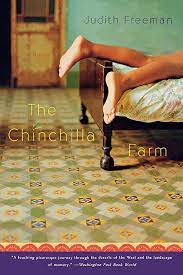Articles/Essays – Volume 23, No. 2
Quest for Meaning | Judith Freeman, The Chinchilla Farm: A Novel
As a child in Willard, Utah, Verna Flake remembered a search party being called when someone had let the neighbors’ chinchillas out of their cage. In the end, fears that the exotic, expensive little animals would never be seen again came to naught, for the chinchillas proved to be too timid and too tame to go anywhere and huddled in two small groups close to the house. For a while we wonder if this is Judith Freeman’s metaphor for small-town Mormonism which, by the standards of mainstream Christianity and American culture, seems so exotic on the surface yet sometimes comes to appear, as it does here under Freeman’s examination, so banal as to be unable to contain a sensitive, searching soul. Eventually, though, we learn that Freeman wants more than that from her metaphor, for she explains to us that chinchillas mate for life, and when a mate is removed, the survivor often goes into depression which can result in death.
This engrossing new novel is a story of lives dislocated by failed marriages and of the quest, not so much for new relationships (though that end either transpires or is implied in each case here), but rather for meaning in a world of failed dreams. It is a big order Freeman sets for herself, since such answers, if one is to avoid sentimentalism, cannot be neat or complete.
To make things even more difficult, she inhabits her story with characters aptly described on the dust jacket as “off center” and delineates their world in inti mate detail. Though the story moves from Willard, Utah, to Los Angeles to Baja, California, its main point of reference is the working-class, Mormon world of Willard, where Verna grew up and where the story opens. To some degree it is the television and country music-saturated world of working-class America, but here it is grafted onto the Mormon elements of sacrament meetings, garments, missionaries, and other institutions so exotic to the non-Mormon world.
When Verna quits her job at the bowling alley after her auto mechanic husband runs off with a barroom floozy named Pinky (don’t you love it?), hitches up a horse trailer full of possessions to her four-wheel-drive truck, picks up a hitch hiking transient named Duluth Wing (!), and heads for Los Angeles where she boards for a time with a friend whose husband is writing a doctoral dissertation on Franz Schubert, the situation begs to be played as farce. But Freeman, amazingly, plays it straight: she is serious about these people, and her sympathetic portrayal brings us along with her into their world.
The novel reaches a tremendous emotional height during the trip to Mexico as Verna helps her ex-sister-in-law Inez and Inez’s retarded daughter escape from a sadistic redneck husband while Duluth tags along seeking relief from alcoholism. The husband follows them, bringing tragedy, but through that tragedy emerges healing for Inez, Duluth, and the daughter. It is healing bought with pain and courage, and under Freeman’s skilled guidance, it is deeply satisfying and realistic.
Other aspects of the novel are less satisfying. Although Freeman’s settings are detailed right down to the last beer can and flat tire, she can’t seem to get her geography right. From Parowan, Verna and Duluth drive west (?) to Orderville, of all places, on their way to St. George, and at one point we learn that one of Verna’s friends is from Thoreau, New Mexico, which we are told is north of Albuquerque. To carp at such gaffes may seem pedantic, but for one who knows this country, they erode the story’s realism.
And marrying Verna to Vincent, the Schubert student, seems quite a reach. Verna’s musical solar system revolves around Patsy Cline, and even though Vin cent gently requires her to listen to classical music on her radio and on the stereo system he buys for her during their courtship, she still doesn’t get it. Nor does she “get” Faust, which Vincent gives her, along with Two Gentlemen of Verona, for reading on her Mexico trip. Maybe she got the Shakespeare better than the Goethe, though we are not told she even read the play, for she and Vincent name their daughter Silvia after the Shakespeare lyric set to music by Schubert. Nevertheless, the nature of the accommodations made by the couple to their radically diverse backgrounds remains largely mysterious.
The Chinchilla Farm follows a collection of short stories, Family Attractions, as Freeman’s second book. One hopes for many more to follow, for it exhibits the emergence of a major literary talent.
The Chinchilla Farm: A Novel by Judith Freeman (New York: W. W. Norton, 1989), 308 pp., $19.95.


 Back to full Issue
Back to full Issue

